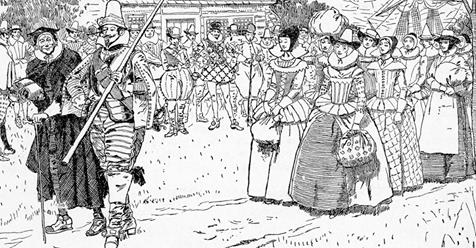1901 dating site...
I am descended from both New England and Virginia's early settlers. How did these people meet and marry? My consideration is often boggled when they came from areas so divergent.
Jamestown Settlement historian Nancy Egloff is interviewed in this History Channel article, 'When the Jamestown Colony Placed Ads to Attract Brides' - https://www.history.com/…/jamestown-colony-women-brides-pro….
Learn more at Jamestown Settlement's special exhibition,'TENACITY: Women of Jamestown and Early Virginia.'
"In 1619, the Jamestown colony—North America’s first permanent English settlement—consisted mostly of single men looking to get rich. For the Virginia Company, this presented a problem: how to keep it growing when few single English women wanted to venture to the struggling colony? The solution it came up with was to pay women’s passage to Jamestown so they could marry its bachelors.
"The Jamestown brides program attracted 90 women who came over in 1620, and another 56 who came over in late 1621 and early 1622.
An illustration of the arrival of the first women to the Jamestown colony.
Bettmann Archive/Getty Images
"Without these women—later known as “tobacco wives”—the Virginia Company was concerned that the 12-year-old colony wouldn’t survive. Unlike the Puritans who would soon settle in New England colonies with their families, the men in Jamestown didn’t have families to keep them in the Americas permanently, says Marcia A. Yablon-Zug, a law professor at the University of South Carolina and author of Buying a Bride: An Engaging History of Mail-Order Matches.
Many Jamestown settlers would “come to the colony, make their fortune, and go home to get married,” she says. A small portion abandoned “the colony to go live in the Indian villages, where obviously there were plenty of women and life was better.” This latter outcome was especially troubling to English religious leaders, who preached sermons about “the sexual availability of the Indian women,” she says.
Wives of settlers arriving at Jamestown.
Bettmann Archive/Getty Images
I know that at least one of my ancestors did marry a Native American woman, who became Christian and adopted an English name. I haven't searched to see if any of my other Jamestown ancestors married a wife who came with these ships. I know one who went back to England to marry and then brought his wife to the Virginia colony.
My American Indian roots:
The Nansemond Indians originally lived along the Nansemond River and were part of the empire ruled by Powhatan, the father of Pocahontas. When the English arrived, the tribe had about 300 warriors and a total perhaps of 1200 people.
They were initially wary and often hostile toward the English, but by the 1630's some had changed their minds. A family sermon book still in the Chief's possession records the 1638 marriage of John Bass, and a Nansemond convert to Christianity named Elizabeth. Everyone in today's Nansemond tribe is a descendant from that marriage. (Source: Smithsonian)
My grandfather, George Rogers' mother was also named Elizabeth (Bette) Bass. She was descended from the early Virginia marriage. (Link to my post on Nansemond tribe). My grandchildren got a kick out of thinking of being cousins to Pocahontas.
Here's our Sepia Saturday for this week.
Perhaps this photo isn't directly connected to brides, or even settlers...but the model and the little ones observing her might end up marrying someone who sought their fortune and then wished to share it through meeting by an unusual method. I know, stretching the meme a bit...
I'm sharing this with 52 Ancestors in 52 Weeks, under the meme "FIRST."





A fascinating aspect of colonial history that was new to me, and how marvelous to trace your ancestry back to,those early settler days.
ReplyDeleteI wonder what it would have felt like to be one of those women coming to the colonies to marry either someone they'd never set eyes on before, or hopefully someone they might have had a least a chance to get to know a little bit first? The picture showing some of the first women arriving has them dressed rather well? I wonder if they actually were dressed quite that well?
ReplyDeleteI enjoyed this immensely. So very interesting. I live near the Nansemonds, and anyone around here with the last name "Bass" is surely a member of the tribe.
ReplyDelete=Sue, thanks. I enjoy finding the stories of some of my ancestors.
ReplyDelete=Gail, I agree that this illustration has the brides in pretty clothes, when it was more likely they had just practical clothes to wear.
=Wendy, that's great that you live in the area where the Nansemonds live. I once thought I'd go up to one of their pow wows, but I probably won't.
America clearly had "social engineering" from the very years of European colonization. The Founding Mothers were just as important as the Founding Fathers. Like Wendy, I know both Jamestown and the Nansemond River area well as I used to live in SE Virginia. Sadly the early native Virginians did not survive very long beyond the 17th century.
ReplyDeleteWonderful history of Colonial America. So enjoyed the history on Tobacco wives. Our family histories are entwined in the same Jamestown to Virginia to Texas. I'm also a descendant of Colonial Settlers, although not a Tobacco Wife. Thanks for visiting CollectInTexas Gal and commenting on my Grandmother's Fur coat. See you for the next 52 Ancestors in January.
ReplyDeleteI've been to Jamestown and I don't remember this being part of the tour. You've given me a whole new perspective! Thank you.
ReplyDeleteIt is fun to try and imagine how unions were made back then. The longing young folks must have felt living far away from towns and neighbors must have lead to a lot of marriages that were based on convenience over love.
An interesting story about your family's Native heritage and the history of the women who came to Jamestown to marry -- a rather brave leap into the future on their part, if they did not know their prospective husbands in advance.
ReplyDelete